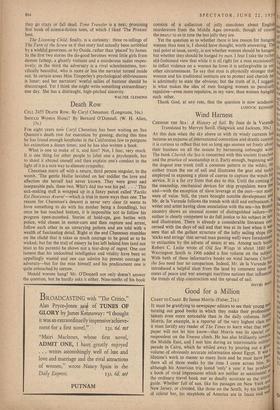Death Row
FOR eight years now Caryl Chessman has been waiting on San Quentin's death row for execution by gassing; during this time he has found enough loopholes in the Californian law to postpone his extinction a dozen times; and he has also written a book.
What is one to make of it, and him? Not, I fear, very much. It is one thing for other people to label one a psychopath, but to shout it abroad oneself and then explain one's conduct in the light of it is a sure way to alienate sympathy.
Chessman starts off with a return, third person singular, to the womb. 'The gentle Hallie lavished on her toddler the love and affection she herself had never known. They were great and inseparable pals, these two. Whit's dad too was his pal. . . This sick-making stuff is wrapped up in a fancy parcel called 'Facilis Est Descensus Averni'—which is true in more ways than one. The reason for Chessman's descent is never very clear (it seems to have something to do with his mother being a foundling), but once he has touched bottom, it is impossible not to follow his progress open-mouthed. Stories of hold-ups, gun battles with police, wild chases in motor-cars and then capture and arrest, follow each other in an unvarying pattern and are told with a wealth of fascinating detail.-Right at the end Chessman stumbles on the cliché that it takes as much courage to be good as to be wicked; but for the trail of misery he has left behind him (and not least to his parents) he shows not a tear-drop of regret. One can lament that his undoubted intelligence and vitality have been so appallingly wasted and one can admire his present courage in adversity—but for the man himself and his predicament one is quite untouched by sorrow.
Should women hang? Mr. O'Donnell not only doesn't answer the question, but he hardly asks it either. Nine-tenths of his book
consists of a collection of jolly anecdotes about English murderesses from the Middle Ages onwards; though of course the nearer to us in time the less jolly they are.
Yet the question as to whether there is less reason for hanging women than men is, I should have thought, worth answering. The real point at issue, surely, is not whether women should be hanged, but whether they should be hanged by men. 1 fear I take the rather old-fashioned view that while it is all right for a man occasionally to inflict violence on a woman he loves it is unforgivable in any other circumstances. To say that man is physically stronger than woman and his traditional instincts are to protect and cherish her is admittedly to state the obvious; but the truth of it,‘ I suggest, is what makes the idea of men hanging women so peculiarly repulsive—even more repulsive, in my view, than women hanging each other.
Thank God, at any rate, that the question is now acadei LUDOVIC KENN
EDY


































 Previous page
Previous page